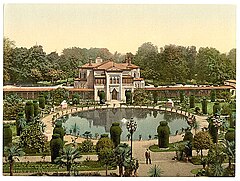Wilhelma
| Wilhelma Zoological-Botanical Garden Stuttgart | |
|---|---|
| (German: Wilhelma Zoologisch-Botanischer Garten Stuttgart) | |

Logo of Wilhelma Zoo and Botanical Garden
|
|

Wilhelma Zoo circa 1900
|
|
|
Location in Germany
|
|
| Alternative names | Schloss Wilhelma |
| General information | |
| Status | Complete |
| Type | Zoo |
| Architectural style | Moorish Revival |
| Classification | Zoo |
| Location | Bad Cannstatt District, Baden-Württemberg |
| Address | Wilhelma 13, 70376 Stuttgart, Germany |
| Town or city | Stuttgart |
| Country | Germany |
| Coordinates | Coordinates: 48°48′19″N 9°12′11″E / 48.80528°N 9.20306°E |
| Opened | 1919 (as a botanical garden), 1951 (first animal exhibit) |
| Client | Wilhelma Zoo |
| Owner | Baden-Württemberg, Ministry of Finance |
| Landlord | Baden-Württemberg, Ministry of Finance |
| Affiliation | Department of Real Estate and Buildings |
| Grounds | 30 hectares (74 acres) |
| Design and construction | |
| Architect | Ludwig von Zanth |
| Known for | Wilbär the polar bear, accidentally breeding of a virulent strain of Caulerpa taxifolia |
| Website | |
| www |
|
![]() Wilhelma is a zoological-botanical garden in Stuttgart in the Bad Cannstatt District in the north of the city on the grounds of a historic castle. Wilhelma Zoo is one of the most popular tourist destinations in Baden-Württemberg, seeing more than 2 million visitors annually.
Wilhelma is a zoological-botanical garden in Stuttgart in the Bad Cannstatt District in the north of the city on the grounds of a historic castle. Wilhelma Zoo is one of the most popular tourist destinations in Baden-Württemberg, seeing more than 2 million visitors annually.
The Zoo and Botanical Garden have been staffed since 1846. The Moorish Revival style echoing the Alhambra have been maintained and supplemented since 1960. Today, the zoo has an area of about 30 hectares (0.30 km2), houses around 11,500 animals from around the world composed of roughly 1,200 species and roughly 6000 plants from all climates. Of Germany's zoos, Wilhelma's collection ranks second to the Berlin Zoological Garden. In addition to the public garden, Wilhelma also has a branch office located in Fellbach, where the zoo keeps its stallions.
Wilhelma receives gorilla juveniles rejected by their mother and reared by the zookeepers. At age 2-3, the gorillas are sent back to their original zoo(s).
In 1829, the property the zoo stood near the mineral springs on the Castle Rosenstein estate. Then Duke William I of Württemberg decided to build a royal bathhouse in the gardens. The Duke decided that the bathhouse should be built in the Moorish style in the same fashion as the Alhambra in the Spanish province of Granada, with an attached Orangery. Unfortunately, construction ground to a halt in 1816 due to economic woes caused by the Year Without Summer, so Wilhelma became just another summer residence of the Dukes and later Kings of Württemberg. Ludwig von Zanth was hired in 1837 to design and construct the Duke's bathhouse.
...
Wikipedia

